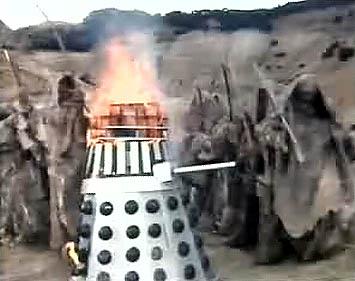Written by Terry Nation
Directed by Michael Briant
After the all-too-extended “Invasion of the Dinosaurs”, this story feels like it moves at a much faster pace. This is a good thing, because when the title of the serial effectively gives away the conclusion to the story, it’s not a promising sign.

The premise seems solid enough at first glance: the TARDIS becomes trapped on a planet where an ancient city saps power from any artificial source that happens by within a certain distance. The Doctor and Sarah Jane discover a primitive race called Exxilons, a trapped foursome of Earther Space Marines trying to mine a cure/treatment for a deadly plague, and finally, a ship full of Daleks. Without power, the Doctor, humans, and Daleks must band together in an uneasy truce to overcome the city’s defenses and escape.
Somehow, this is turned into quite the boring “adventure”, which also goes a long way towards pointing out how ridiculous the Daleks really are. It doesn’t start that way; the Daleks begin by being rather clever, fashioning mechanical weapons to replace their energy guns, and using their inherent psychokinesis to move around without power. What becomes problematic is the notion that the Daleks are clever, inventive evil scientists bent on galactic domination, when their most ingenious ideas for getting around involve an unwieldy pepperpot body and a bunch of extremely limiting appendages. Oh, and never mind the “Dalek cam”, which essentially points out how the diabolically brilliant Daleks invented “super tunnel vision”.
In other words, this serial (more than any other up to this point) made it nearly impossible to suspend disbelief and ignore the massive contradictions. At least previous serials made some minor attempt to explain the limitations of the Dalek design; this notion of psychokinesis just doesn’t fit into the psychology behind the construction of the Dalek exosuits. If they can use psychokinesis to move themselves and such, why not use it in other respects? Like, for instance, as a weapon in and of itself?
There’s also the rigid and illogical thinking that leads at least two Daleks to suicidal actions in the course of the story. Rushing a bunch of Exxilons, who have plenty of weapons, screaming “Exterminate!” while being beaten to a fiery pulp? Committing suicide via self-destruct because some prisoners escape? It just didn’t make much sense to me.
Towards the end, the Doctor and a peaceful Exxilon named Bellal infiltrate the city. They start in an antechamber filled with skeletons of those who failed to solve the mental challenges necessary to proceed through to the control center. These mental challenges involve, among other things, a maze and a game of hopscotch. Granted, the final challenge is an assault upon one’s sanity and a battle against some rather effective “antibodies”, but it’s hard to imagine that the earlier puzzles were demanding enough to cause anyone enough trouble for them to be trapped unto death!
Even on the level of the incidental music, this serial just swings and misses. In keeping with the “no power” theme, the music switches from electronically produced fare to saxophones and percussion. Somehow, this led to the idea of giving the Daleks, the Doctor’s most fearsome foe, a jaunty little saxophone riff as an intro. This is wrong on so many levels.
If there is a highlight of this story, it’s Sarah Jane. In just a couple serials in Season 11, she has established herself as a far more enjoyable character than Liz or Jo. Considering that Jon Pertwee shows little life in his performance at this point, it’s clear that Sarah Jane is a Companion in need of a new Doctor. Of course, as we all know, that comes soon enough. (But first, a return to Peladon!)
Writing: 1/2
Acting: 1/2
Direction: 1/2
Style: 1/4
Final Rating: 4/10

